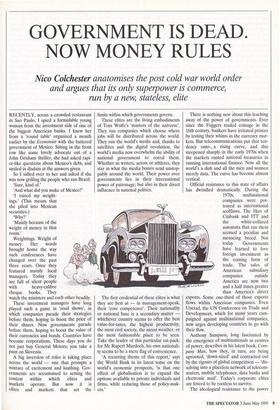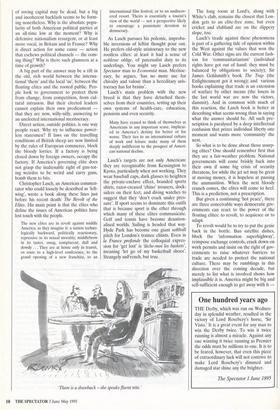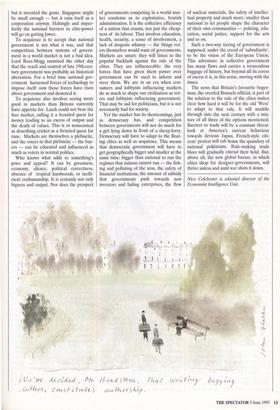GOVERNMENT IS DEAD.
NOW MONEY RULES
Nico Colchester anatomises the post cold war world order
and argues that its only superpower is commerce, run by a new, stateless, elite
RECENTLY, across a crowded restaurant in Sao Paulo, I spied a formidable young woman from the investment side of one of the biggest American banks. I knew her from a 'round table' organised a month earlier by the Economist with the battered government of Mexico. Sitting in the front row like some lovely advocate out of, a John Grisham thriller, she had asked rapi- er-like questions about Mexico's debt, and smiled in disdain at the answers given.
So I sidled over to her and asked if she was now grilling the people who run Brazil. `Sure, kind of.'
'And what did you make of Mexico?'
'I raised my weight- ings.' (This means that she piled into Mexican securities.) 'Why?'
'Mainly because of the weight of money in that room.'
Weightings. Weight of money. Her words brought home the way such conferences have changed over the past three years. Once they featured mainly local managers. Today they are full of silent people These investment managers have long played such a game in 'road shows', in which companies parade their strategies before them, hoping to boost the price of their shares. Now governments parade before them, hoping to boost the value of their currencies and bonds. Countries have become corporations. These days you do not just buy General Motors; you take a punt on Slovenia.
A big inversion of roles is taking place across the world — one that prompts a mixture of excitement and loathing. Gov- ernments are accustomed to setting the context within which elites and markets operate. But now it is elites and markets that set the limits within which governments govern.
These elites are the living embodiments of Tom Wolfe's 'masters of the universe'. They run companies which choose where jobs will be distributed across the world. They run the world's media and, thanks to satellites and the digital revolution, the world's media now overwhelm the ability of national government to corral them. Whether as writers, actors or athletes, they star in what the media bosses send unstop- pably around the world. Their power over governments lies in their international power of patronage; but also in their direct influence in national politics.
The first credential of these elites is what they are pest at — in management-speak, their 'core competence'. Their nationality or national base is a secondary matter whichever country seems to offer the best value-for-taxes, the highest productivity, the most civil society, the nicest weather, or the most fashionable place to be seen. Take the leader of this particular rat-pack: for Mr Rupert Murdoch, his own nationali- ty seems to be a mere flag of convenience.
'A recurring theme of this report,' says the World Bank in its latest tome on the world's economic prospects, 'is that one effect of globalisation is to expand the options available to private individuals and firms, while reducing those of policy-mak- ers.' There is nothing new about this leaching away of the power of governments. Ever since the Fuggers traded coinage in the 16th century, bankers have irritated princes by testing their whims in the currency mar- kets. But telecommunications put that ten- dency onto a rising curve, and this steepened sharply in the early 1970s when the markets ousted national treasuries in running international finance. Now all the world's a dish and all the men and women merely data. The curve has become almost vertical.
Official resistance to this state of affairs has dwindled dramatically. During the 1970s, multinational companies were por- trayed as international scofflaws. The likes of Citibank and ITT and the white-collared automata that ran them seemed a peculiar and menacing breed. Not today. Governments have learned to love foreign investment as the coming form of trade. The sales of American subsidiary companies outside America are now two and a half times greater than America's direct exports. Some one-third of those exports flows within American companies. Even Unctad, the UN Conference on Trade and Development, which for many years cam- paigned against multinational companies, now urges developing countries to go with their flow.
Anthony Sampson, long fascinated by the emergence of multinationals as centres of power, describes in his latest book, Com- pany Man, how they, in turn, are being uprooted, 'down-sized' and contracted out by the rigours of global competition — 'dis- solving into a placeless network of telecom- muters, mobile telephones, data banks and electronic mail'. Today's corporate elites are forced to be rootless to The ideological resistance to the power of roving capital may be dead, but a big and incoherent backlash seems to be form- ing nonetheless. Why is the absolute popu- larity of both American political parties at an all-time low at the moment? Why is defensive nationalism resurgent, or at least more vocal, in Britain and in France? Why is direct action for some cause — action that eschews political channels — the com- ing thing? Why is there such glumness at a time of growth?
A big part of the answer may be a rift in the old, rich world between the interna- tional 'them' and the local 'us', between the floating elites and the rooted public. Peo- ple look to government to protect them from change, from competition, from cul- tural intrusion. But their elected leaders cannot explain their own predicament that they are now, willy-nilly, answering to an unelected international meritocracy.
Direct action, outside politics, is one way people react. Why try to influence power- less statesmen? If laws on the travelling conditions of British sheep are now limited by the rules of European commerce, block the bloody lorries. If a factory is being closed down by foreign owners, occupy the factory. If America's governing elite does not grasp the inalienable right of gun-tot- ing weirdos to be weird and carry guns, bomb them to bits.
Christopher Lasch, an American commen- tator who could loosely be described as `left- wing', wrote a book along these lines just before his recent death: The Revolt of the Elites. His main point is that the elites who define the issues of American politics have lost touch with the people.
The new elites are in revolt against middle America, as they imagine it: a nation techno- logically backward, politically reactionary, repressive in its sexual morality, middlebrow in its tastes, smug, complacent, dull and dowdy . They are at home only in transit, en route to a high-level conference, to the grand opening of a new franchise, to an
international film festival, or to an undiscov- ered resort. Theirs is essentially a tourist's view of the world — not a perspective likely to encourage a passionate devotion to democracy.
As Lasch pursues his polemic, improba- ble inversions of leftist thought pour out. He prefers old-style aristocracy to the new rootless elites: at least it had a sense of noblesse oblige, of paternalist duty to its underlings. You might say Lasch prefers Spectator man to Economist man. Meritoc- racy, he argues, 'has no more use for chivalry and valour than a hereditary aris- tocracy has for brains'.
Lasch's main problem with the new breed is that they have detached them- selves from their countries, setting up their own systems of health-care, education, pensions and even security.
Many have ceased to think of themselves as Americans in any important sense, implicat- ed in America's destiny for better or for worse. Their ties to an international culture of work and leisure make many of them deeply indifferent to the prospect of Ameri- can national decline.
Lasch's targets are not only American: they are recognisable from Kensington to Kyoto, particularly when not working. They wear baseball caps, dark glasses to heighten the private-enclave effect, branded sports shirts, razor-creased 'chino' trousers, dock- siders on their feet, and diving watches to suggest that they 'don't crack under pres- sure'. If sport seems to dominate this outfit that is because sport is the ether through which many of these elites communicate. Golf and tennis have become denation- alised worlds. Sailing is headed that way. Hyde Park has become one giant softball pitch for London's trainee elitists. Even in la France profonde the colloquial expres- sion for 'get lost' is `lache-moi les baskets', meaning 'let go of my basketball shoes'. Strangely unFrench, but true.
`There is a drawback – she speaks fluent trite.' The long room at Lord's, along with White's club, remains the closest that Lon- don gets to an elite-free zone, but even cricket and clubland are on the slippery slope, too.
Lasch's tirade against these phenomena is part of a gathering tide of opinion within the West against the values that won the Cold War. Other signs are the current fash- ion for `communitarianism' (individual rights have got out of hand: they must be balanced by obligations to society); Sir James Goldsmith's book The Trap (the Enlightenment got it wrong); and various books explaining that trade is an extension of warfare by other means (the losers in the last world war are now the victors, dammit). And in common with much of this reaction, the Lasch book is better at describing what seems wrong than in saying what the answer should be. All such pre- scription is paralysed by a deep intellectual confusion that prizes individual liberty one moment and wants more 'community' the next.
So what is to be done about those usurp- ing elites? One should remember first that they are a fair-weather problem. National governments will come briskly back into their own if some big crisis of security threatens, for while the jet set may be great at moving money, it is hopeless at passing the ammunition. When the next bloody crunch comes, the elites will come to heel. This is a prediction, not a prescription.
But given a continuing 'hot peace', there are three conceivable ways democratic gov- ernments can react to the power of the floating elites: to revolt, to acquiesce or to adapt.
To revolt would be to try to put the genie back in the bottle. Ban satellite dishes, block the 'information superhighway', reimpose exchange controls, crack down on work permits and insist on the right of gov- ernments to raise whatever barriers to trade are needed to protect the national culture. There may be rumblings in this direction over the coming decade, but merely to list what is involved shows how implausible it is. America might be big and self-sufficient enough to get away with it — but it invented the genie. Singapore might be small enough — but it runs itself as a corporation anyway. Haltingly and imper- fectly the national barriers to elite-power will go on getting lower.
To acquiesce is to accept that national government is not what it was, and that competition between systems of govern- ment in a world market is not a bad idea. Lord Rees-Mogg surmised the other day that the reach and control of late 19th-cen- tury government was probably an historical aberration. For a brief time national gov- ernment harnessed forces of technology to impose itself: now those forces have risen above government and demoted it.
To acquiesce also involves seeing more good in markets than Britons currently have appetite for. Lasch could not bear the free market, calling it a frenzied quest for money leading to an excess of output and the death of values. This is as nonsensical as describing cricket as a frenzied quest for runs. Markets are themselves a plebiscite, and the voters in that plebsicite — the buy- ers — can be educated and influenced as much as voters in normal politics.
Who knows what adds to something's price and appeal? It can be greenness, economy, silence, political correctness, absence of tropical hardwoods, or ineffi- cient craftsmanship. It is certainly not only bigness and output. Nor does the prospect of governments competing in a world mar- ket condemn us to exploitative, brutish administration. It is the collective efficiency of a nation that counts, not just the cheap- ness of its labour. That involves education, health, security, a sense of involvement, a lack of despotic whimsy — the things vot- ers themselves would want of governments. Markets are smart: they will listen to the popular backlash against the rule of the elites. They are influenceable: the very forces that have given them power over government can be used to inform and steer them. We are in an era when con- sumers and lobbyists influencing markets do as much to shape our civilisation as vot- ers and lobbyists influencing government. That may be sad for politicians, but it is not necessarily bad for society.
Yet the market has its shortcomings, just as democracy has, and competition between governments will not do much for a girl lying down in front of a sheep-lorry. Democracy will have to adapt to the float- ing elites as well as acquiesce. This means that democratic government will have to get geographically bigger and smaller at the same time: bigger than national to run the regimes that nations cannot run — the fish- ing and polluting of the seas, the safety of financial institutions, the amount of subsidy that governments push towards new investors and failing enterprises, the flow of nuclear materials, the safety of intellec- tual property and much more; smaller than national to let people shape the character of their own communities — policing, edu- cation, social justice, support for the arts and so on.
Such a two-way tiering of government is supposed, under the creed of `subsidiarity', to be the vision of the European Union. This adventure in collective government has many flaws and carries a tremendous baggage of history, but beyond all its errors of excess it is, in this sense, moving with the times.
The news that Britain's favourite bogey- man, the overfed Brussels official, is part of the solution to the rule of the elites makes clear how hard it will be for the old 'West' to adapt to that rule. It will muddle through into the next century with a mix- ture of all three of the options mentioned. Barriers to trade will be a constant threat: look at America's current behaviour towards devious Japan. French-style citi- zens' protest will rub home the quandary of national politicians. Rule-making trade blocs will gradually extend their hold. But, above all, the new global bazaar, in which elites shop for designer-governments, will thrive unless and until war shuts it down.
Nico Colchester is editorial director of the Economist Intelligence Unit.




































































 Previous page
Previous page